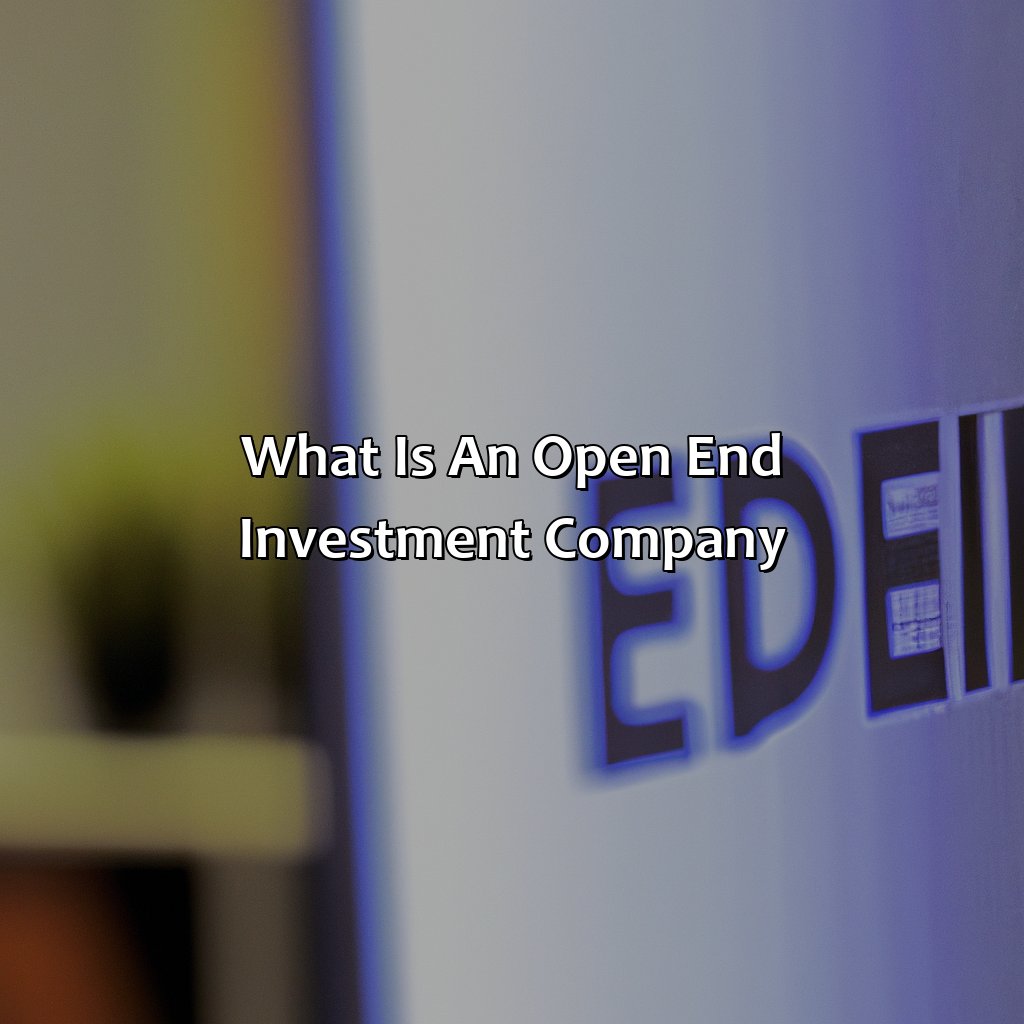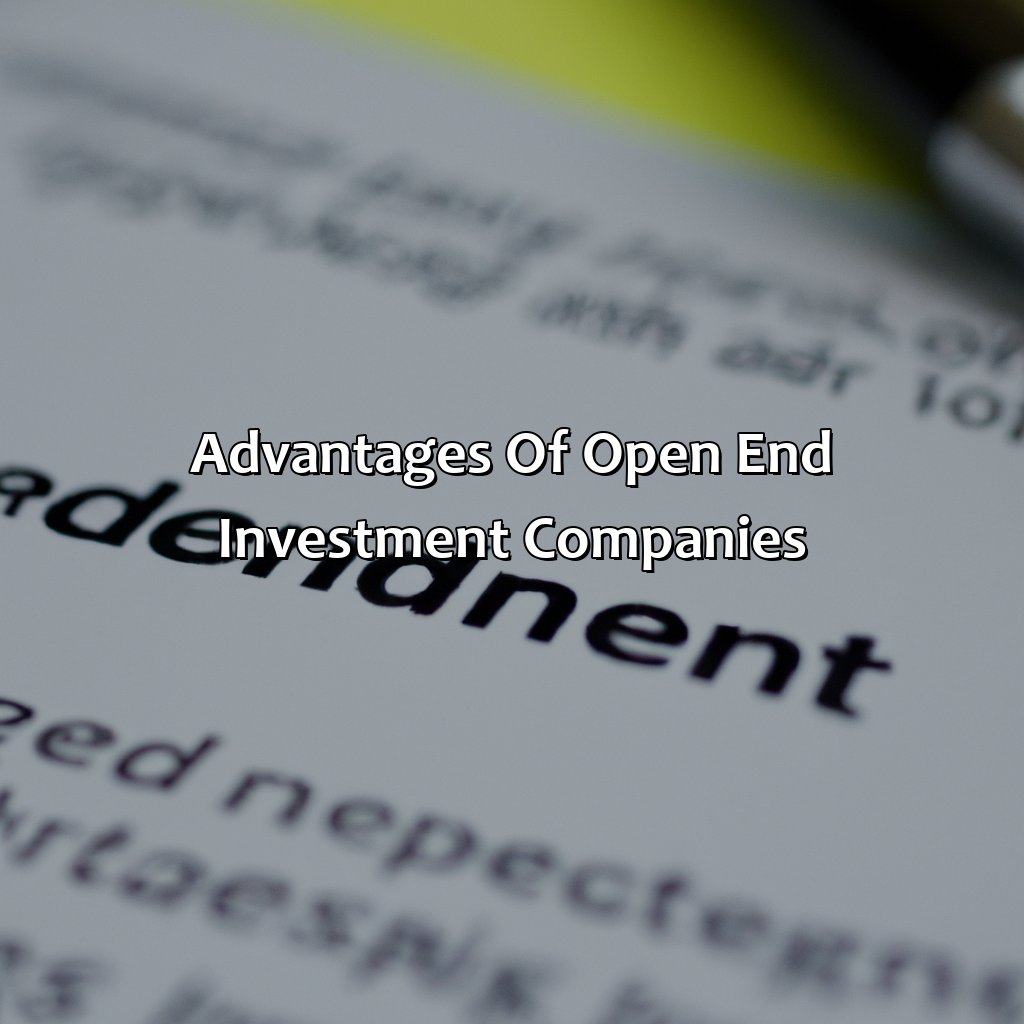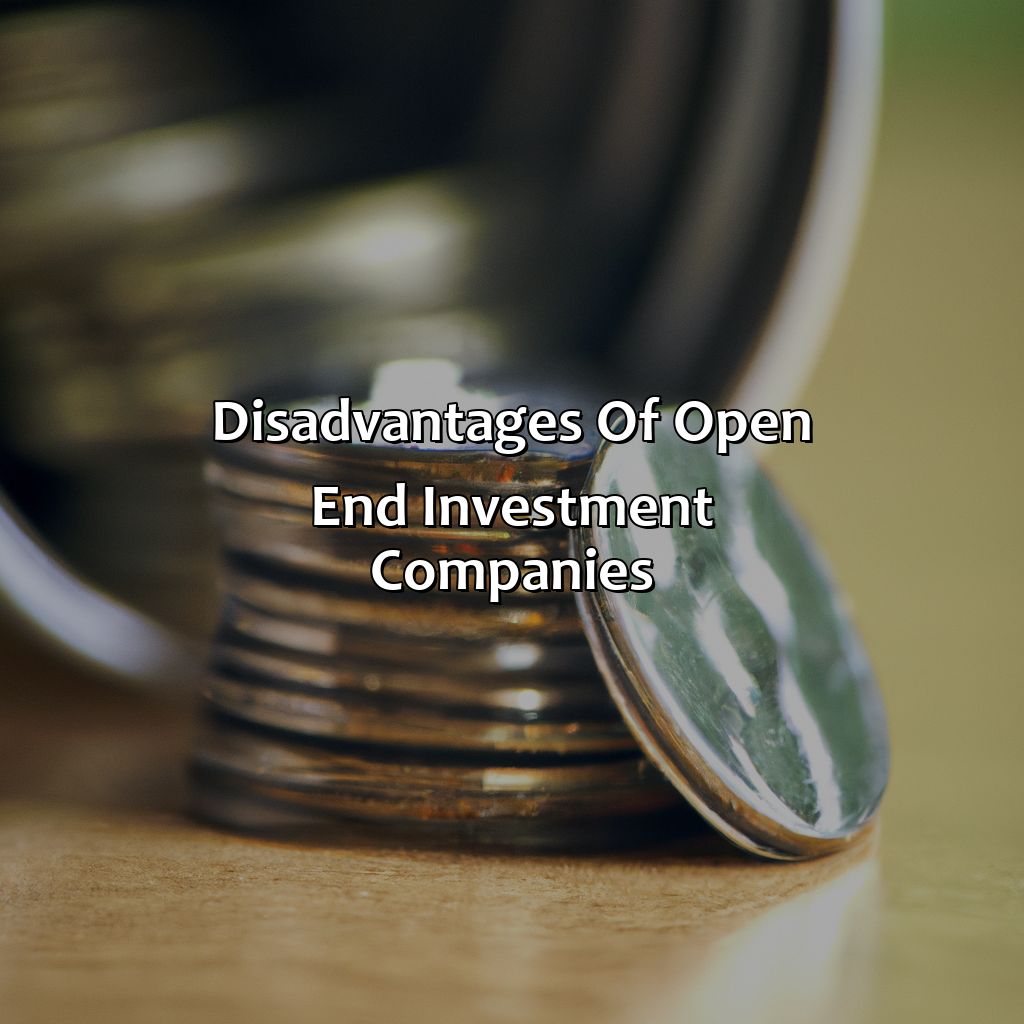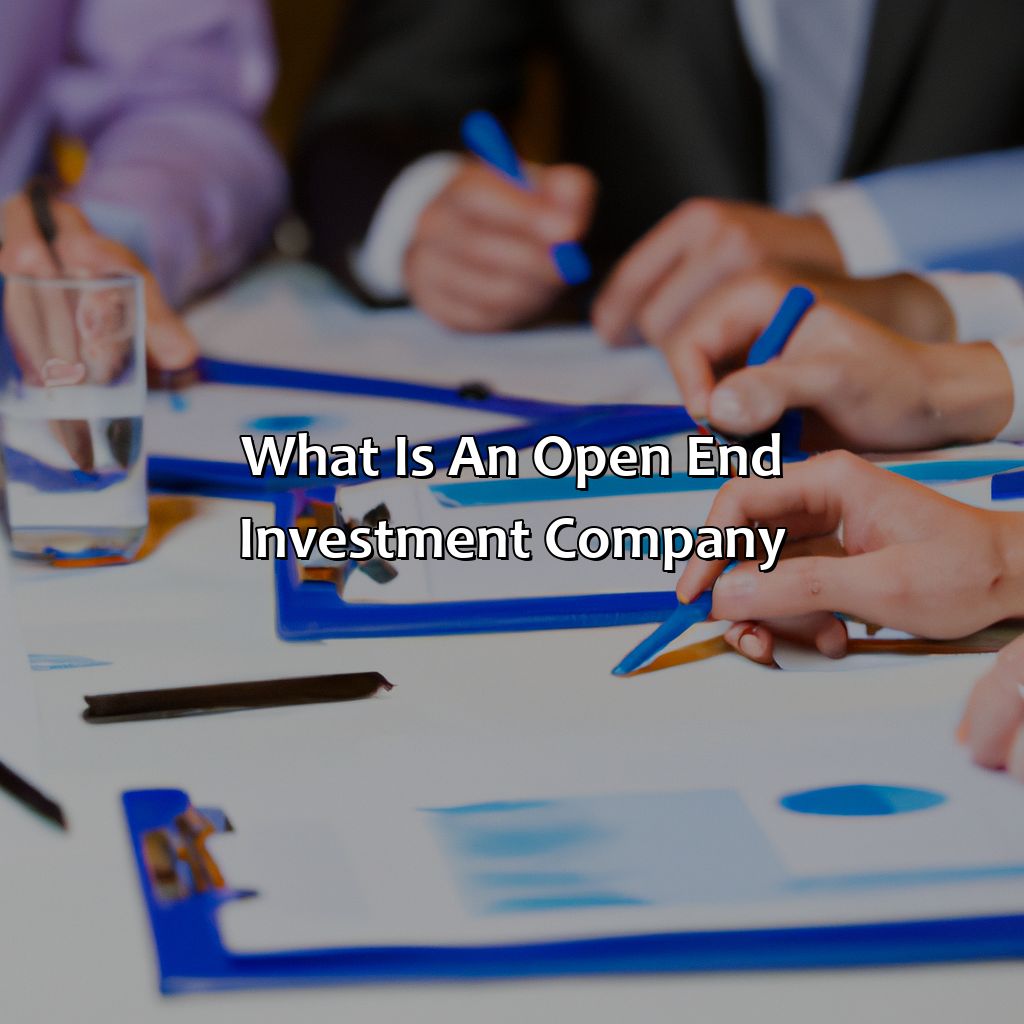What Is An Open End Investment Company?
Key Takeaway:
- An open end investment company is a type of investment company that pools money from investors to invest in a diversified portfolio of securities. The fund continuously issues and redeems shares, allowing investors to buy and sell shares at any time.
- There are different types of open end investment companies, including stock funds, bond funds, and money market funds. Stock funds invest in stocks, bond funds in bonds, and money market funds in short-term, low-risk securities.
- Open end investment companies are managed by professional fund managers who invest money on behalf of the investors. They use the pooled money to buy and sell securities in an effort to achieve the investment objectives of the fund.
Key Takeaway:
- Open end investment companies offer several advantages, including diversification of investment portfolio, lower investment cost due to economies of scale, and liquidity of shares, which means investors can buy and sell shares at any time without affecting the fund’s operations.
- Investors benefit from the professional management of the fund, which may result in higher returns than individual investors may achieve on their own. Additionally, open end investment companies offer easy access to a variety of asset classes without the need for extensive knowledge of the stock market or other investment vehicles.
- However, open end investment companies also have some disadvantages, such as management fees and other expenses, which can reduce the overall returns. There is also limited control over investments, as the fund manager makes investment decisions on behalf of all investors. Lastly, there is potential for underperformance compared to market indexes.
Struggling to understand what an open-end investment company is? You’re not alone – many are confused about this type of company. Luckily, this article provides a comprehensive explanation of open-end investment companies, uncovering the essential details you need to know.
What is an open end investment company?
What’s an open end investment company? Let’s explore! Its definition and explanation are key. Different types exist. Insight: how do they work?

Image credits: retiregenz.com by Joel Jones
Definition and explanation of open end investment company
Open end investment company is a type of mutual fund that allows investors to buy and sell shares at any time. The company issues new shares as demand increases and buys back shares as demand decreases, making it easier to buy or sell. This differs from closed-end funds where the number of outstanding shares is limited. Open end investment companies are regulated by the SEC and must meet certain requirements to ensure transparency, liquidity, and proper management.
Investors in an open end investment company benefit from professional management, diversification of assets, and potential for higher returns. These companies also offer flexibility in terms of buying and selling shares, which makes them an attractive option for those who want to invest but do not have a large amount of capital upfront.
Unique details about open end investment companies include the fact that they can be actively managed or passively managed. Actively managed funds have a portfolio manager making decisions on which securities to invest in while passive funds aim to match the performance of a specific index or benchmark.
Pro Tip: Before investing in an open end investment company, carefully read its prospectus and consider factors such as fees, past performance, and the risks associated with the fund’s investments. Investment companies come in all shapes and sizes, but open end ones are like a bottomless pit, always ready for more.
Types of open end investment companies
Open end investment companies can have different structures and investment strategies. Here are some examples of the various types:
| Type | Description |
|---|---|
| Equity funds | Invests primarily in stocks |
| Bond funds | Invests primarily in bonds and other fixed-income assets |
| Balanced funds | Invests in both stocks and bonds |
| Ethical/Socially responsible | Considers environmental, social, or governance factors |
In addition to these types, open end investment companies can also be classified by their risk level, geographic focus, or target industries. It is crucial to select the right type based on your financial goals and risk tolerance.
To choose the suitable type, consult with a professional financial advisor who can evaluate your objectives and recommend options that align with your investment style. Also, consider diversifying your portfolio by investing in multiple types of open end investment companies.
Investors must keep an eye on ongoing fees and expenses while choosing the type of open end investment company because higher costs reduce returns. Lastly, it’s essential to stay informed about market trends to make informed decisions.
Open end investment companies are like a never-ending buffet – you can keep investing and withdrawing as much as you want, all while the menu keeps expanding.
How open end investment companies work
Open end investment companies allow investors to buy and sell shares of the company’s portfolio at any time throughout the trading day. The value of these shares is determined by the net asset value of the company’s holdings divided by the number of outstanding shares. Investors pool their money together, allowing portfolio managers to invest in a diverse range of assets such as stocks, bonds, and real estate. This offers investors greater flexibility and liquidity.
Investors can benefit from an open-ended fund’s ability to grow with the market, offering potential long-term gains. However, expenses such as management and advisory fees are deducted from shareholder returns. It’s important for investors to research the underlying assets within a fund before investing.
Unique to open end investment companies is their ability to continuously issue new shares or redeem existing ones, preventing large fluctuations in share prices due to supply and demand imbalances. Additionally, they are required by law to publicly disclose their holdings regularly, providing transparency for investors.
To maximize returns and minimize risks when investing in open end investment companies, it’s crucial for investors to diversify their investments across multiple funds with varying asset classes and risk levels. It’s also important to monitor the performance of each fund regularly and consider working with a financial advisor who can provide guidance on investment decisions based on individual financial goals and risk tolerance levels.
Why settle for a closed book when you can invest in an open end investment company?
Advantages of open end investment companies
Ready to explore the advantages of open end investment companies? Diversification of investment portfolio, lower costs & liquid shares are some of the perks! For newbies looking to maximize earnings with minimal overhead, these sub-sections offer solutions.

Image credits: retiregenz.com by Harry Woodhock
Diversification of investment portfolio
Investing in an open-end investment company provides ample opportunities to diversify your investment portfolio. Exposure to stocks, bonds, and other financial instruments is essential for investors looking to spread risks and maximize returns. With the help of professional fund managers, investors can gain access to a diversified range of assets without buying individual securities. This increased exposure and access can provide better returns in the long run and help moderate risk.
In addition, investing in open-end investment companies allows for easy buying and selling of funds at any time, which helps investors react quickly to market fluctuations. Investors can also choose between different funds with varying risk levels and investment objectives that cater to their unique needs.
Moreover, investment companies’ pooling effect enables small-scale investors to access funds they would not have been able to afford independently. Consequently, investing through these companies ensures a level playing field for all investors.
Don’t miss out on lucrative investment opportunities due to lack of diversification– invest in open-end investment companies today! By creating a diversified portfolio with the assistance of professional fund managers, you’ll be better prepared for future market fluctuations. Who said investing had to cost an arm and a leg? With open end investment companies, you can keep your limbs and your savings intact.
Lower investment cost
One of the advantages of investing in open end investment companies is the potential lower cost. This can be attributed to economies of scale they benefit from due to pooling investors’ funds. As such, investors in open-end investment companies can access diversified portfolios with relatively smaller amounts necessary for building a portfolio.
Furthermore, open-end investment companies often come with low expenses ratios and fewer transaction fees compared to actively managed funds or direct investments. Combined with reduced advisory fees, it translates into less money spent on fund management and more returns on investments made.
It’s worth noting that lower cost doesn’t necessarily translate into inferior quality or poor returns; but rather, it could lead to higher returns as a result of prudent financial decisions made and better outcomes achieved over time.
Investors interested in lowering their portfolio cost could consider investing in low-cost index funds, avoiding chasing hot trends or speculative stocks that come at a premium price. Diversifying their portfolios across different asset classes in proportion could also help mitigate risks while improving return potential.
In summary, open-end investment companies offer significant advantages over other types of investments, particularly when it comes to reducing costs associated with fund management. Potential investors should always conduct research and seek professional advice before making any investment decisions to maximize return potential while minimizing risk exposure.
Buy and sell like a pro with open-end investment companies – no need to cry over spilled shares.
Liquidity of shares
Shares in open-end investment companies can be easily bought or redeemed at any time, resulting in high liquidity. This allows investors to quickly access their funds when needed. Such liquidity is achieved through the fund company continuously issuing and redeeming shares based on demand from investors. With a wide range of investments, open-end funds offer diversity that not only reduces risks but also enhances returns.
Moreover, investors get the benefit of professional management without needing to manage their individual portfolios actively, providing a low-stress form of investment for those who do not have the time or expertise required. A unique feature of such funds is that they also tend to have lower expenses compared to other funds making them an efficient way of investing your money.
In reality, Open-end Investment Companies provide redemption plans that allow shareholders to sell shares easily, without fluctuating market prices affecting the sales price – Investopedia.
Why choose between risking it all or playing it safe when you can have both with open end investment companies? But wait, there’s more…
It’s not all sunshine and rainbows with open end investment companies – here are the cons you need to know.
Disadvantages of open end investment companies
To get a grasp of the risks of investing in open-end investment companies, recognize their cons. To tackle these, become knowledgeable of:
- Management fees plus other costs
- Limited control over investments
- Possible underperformance relative to market indexes

Image credits: retiregenz.com by Adam Duncun
Management fees and other expenses
Investment Expenses and Management Fees are critical aspects of an Open End Investment Company that require attention. These costs cover the maintenance of the investment, such as managers’ salaries, operational costs, distribution expenses, custodian fees, among others. They impact the investor’s overall returns and reduce any potential profit or cause losses.
Below are essential costs associated with an Open End Investment Company:
| Cost | Definition |
|---|---|
| Management fees | A fee charged by a fund manager for managing investment assets on behalf of investors. |
| Operating expenses | The cost of operating a fund for administrative purposes. |
| Distribution charges | Charges paid to compensate brokers and other intermediaries that distribute funds to the shareholders |
| Other expenses | These include legal and accounting fees. Most funds assess these additional charges separately from operating expenses. |
The higher the expense ratio, the lower the net return of investors. However, minimizing fees does not guarantee better returns.
It is noteworthy that a high-cost ratio is not necessarily negative if the fund manager has a good performance record. Therefore it is necessary to build a portfolio based on personal goals and investment strategy.
According to Morningstar research studies conducted over several years across various funds, one percentage point difference in expense ratios can decrease returns by up to 15%.
Open end investment companies – because sometimes it’s better to not have a say in where your money goes.
Limited control over investments
Investors in open end investment companies have limited control over their investments due to the structure of these companies. The investors pool their money together and leave the decision-making to a professional fund manager. This means that investors do not have control over which specific securities are bought or sold within the fund.
Moreover, an investor’s activities within an open end investment company are restricted by other investors’ actions. If many people try to sell their shares at once, this can create a problem for others who want to buy or keep their shares. The price may fall consistently because supply exceeds demand; therefore, selling too soon can lead to missed opportunities.
Interestingly, according to The Balance (2019), over half of U.S households were indirectly invested in open end mutual funds through 401(k) plans and other employer-sponsored retirement programs.
Potential for underperformance compared to market indexes
Open-end investment companies have the potential of failing to match market indexes, resulting in underperforming investments. This occurs because open-end investment firms rely heavily on fund managers’ decisions, making it challenging to predict and follow a specific strategy towards risk management.
Managers may not always make informed decisions or react quickly enough to changes in the financial markets, leading to underperformance. Additionally, open-end funds charge higher fees than passive funds since they rely on expert advice and actively trade securities.
To avoid underperformance, one can consider investing in index funds that track specific indices instead of relying on fund managers’ expertise. It’s also critical to diversify investments across various sectors and use a long-term investment strategy.
Investors must do their due diligence by researching companies before investing their money. They should also compare different options and understand the relevant risks involved in each type of investment instrument carefully. By taking these precautions, individuals can minimize their chances of experiencing underperformance while maximizing returns over time.
Five Well-Known Facts About Open End Investment Companies:
- ✅ Open end investment companies, also known as mutual funds, pool money from investors to purchase a diversified portfolio of securities. (Source: Investopedia)
- ✅ Investors in open end investment companies can buy or sell their shares at any time, and the price is based on the net asset value (NAV) of the fund. (Source: The Balance)
- ✅ Open end investment companies offer professional management and diversification, making them a popular choice for many individual investors. (Source: Forbes)
- ✅ Open end investment companies are required by law to provide regular disclosures and reports to investors, including information on the fund’s holdings and performance. (Source: SEC)
- ✅ The Securities and Exchange Commission (SEC) regulates open end investment companies to protect investors and ensure transparency and fairness in the market. (Source: SEC)
FAQs about What Is An Open End Investment Company?
What is an open end investment company?
An open end investment company, also known as a mutual fund, is a type of investment company that pools funds from numerous investors to purchase a diversified portfolio of securities. The number of shares of the mutual fund is not fixed and can increase or decrease based on investor demand.
How is the value of an open end investment company calculated?
The value of an open end investment company is calculated by taking the net asset value (NAV) of the fund. The NAV is determined by subtracting the liabilities of the fund from the assets and dividing by the number of outstanding shares of the fund. The NAV is calculated at the end of each business day.
What are the advantages of investing in an open end investment company?
Investing in an open end investment company allows for diversification of investments without the need for extensive research and monitoring of individual securities. Additionally, mutual funds offer professional management and liquidity, as investors can typically buy and sell shares on a daily basis.
What are the risks associated with investing in an open end investment company?
Investing in an open end investment company comes with several risks, including market risk, credit risk, and interest rate risk. Additionally, mutual funds may be subject to fees and expenses, which can reduce overall returns.
How do I choose the right open end investment company for me?
To choose the right open end investment company, investors should consider their investment goals, risk tolerance, and investment time horizon. Additionally, investors should research the track record and fees and expenses of different mutual funds before making a decision.
Can I lose money investing in an open end investment company?
Yes, investors can lose money investing in an open end investment company. Mutual funds are subject to market risk, and the value of the fund may decrease due to a variety of factors, including economic conditions and changes in interest rates.
